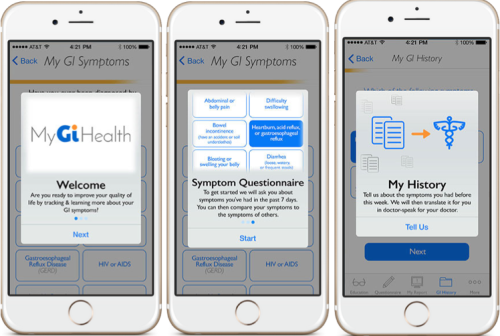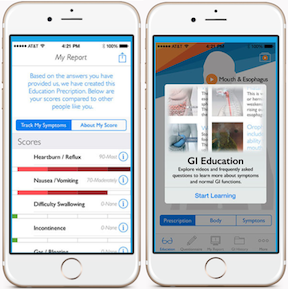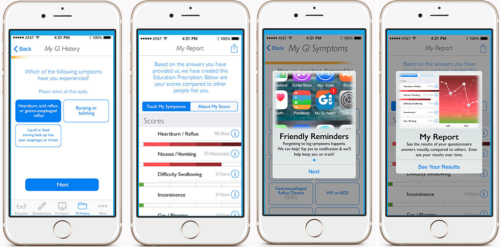Bridging the Autoimmune Abyss - Exploring the Connection between Food and Digestive Diseases with MyGiHealth
By Bonnie Feldman and Ellen M Martin
Digital health is filled with promise, but for autoimmune patients many gaps persist. With an eye to bridging those gaps, I recently attended two very different conferences:
The Interdisciplinary Autoimmune Summit was a continuing education meeting to help practicing physicians better treat complex autoimmune patients using a multidisciplinary, collaborative approach. Not surprisingly, both patients and their care teams are looking for better ways to identify and manage chronic disease.
In sharp contrast, the annual Quantified Self meeting reflects the perspective of individual experimenters with various states of health and disease using digital tools to tweak their own health.
Both meetings exemplify collaborative efforts to address complex health issues. As such, they provided essential background for my conversation with the team at MyGiHealth, a company with products targeting both clinical and individual markets.
A New Clinical Perspective - collecting data and creating useful feedback loops for practitioners and patients
At the Interdisciplinary Autoimmune Summit, practicing physicians revealed their desire for better tools to help manage complex autoimmune cases across disciplines.
As a clinician, health services researcher, and co-founder of MyGiHealth, Dr. Brennan Spiegel is acutely aware of the needs of autoimmune patients. He explains: “MyGiHealth was born out of a desire to gather evidence. We wanted to create tools that would go beyond the four walls of the exam room and meet people where they live, work, and play.”
“The system is a win-win, because it improves efficiency for doctors and also outcomes for patients,” noted Dr. Spiegel.
The clinical version of MyGiHealth is an automated, online mobile app that captures, assesses and interprets gastrointestinal symptoms based on a data-logic algorithm. The questions are filled out by the patient ahead of the medical appointment and the system turns the patient history data into useable clinical information that saves time at the physician’s office for face-to-face interaction.

We started by focusing on making the clinical process more efficient by improving the history-taking process. Bringing together more than 5 years of research, including NIH research, we created the first MyGiHealth.” Particularly noteworthy is a study showing that the quality of these patient histories is as good as those from some of America’s best doctors.
Additionally, MyGiHealth offers patient education modules that include interactive visual journeys through the GI tract and tutorials on how the GI system interacts with the nervous system.
With the vast amount of information on the Internet about health-related issues –both credible and questionable – MyGiHealth’s visuals and tutorials provide a channel that keeps its users on track and away from harmful misinformation. MyGiHealth is a place where people can go to assess their symptoms and receive tailored education produced by communications experts at the University of Michigan, in collaboration with expert doctors and other patients with GI problems. A user can learn about how the GI tract functions normally, what can go wrong to cause symptoms, and even get advice on simple diet, lifestyle and over-the-counter solutions that might work for their symptoms.

The MyGiHealth app can be stand-alone or integrated into a practice’s electronic health records. For example, they are currently working with Athena Health’s ‘More Disruption Please’ program to integrate into their system.
Given my view that the autoimmune community needs collaboration from all stakeholders (see my earlier posts on the Multiple Myeloma Research Foundation and the Rare Genomics Institute), a partnership with Ironwood is another great step.
A New Individual Perspective - patients using data, feedback loops and personalized nutrition to guide behavior change
Beyond the clinic, MyGiHealth wants to “democratize GI health through the creation of a consumer version.”
“The MyNutritionHealth (MNH) app is intended to identify the causal relationship between food and symptoms.” It is “important to gather objective evidence between what one is eating and the symptoms that one is experiencing. We are trying to shed light on a murky area with a structured, objective, empirical, statistically based approach to evaluating food and symptoms.”
This is how the app works:
- Users complete a special diary called a “food frequency questionnaire” that allows MNH to identify whether they are eating foods containing certain carbohydrates (lactose, fructans, FODMAPs, etc.) or proteins (gluten, as well as non-gluten proteins) which might cause GI problems.
- Users tell the app when they eat a meal and record what they eat
- Push notifications ask the user about symptoms.
- For a series of days, the app calculates an area under a curve to show correlative relationships between food and symptoms.

The app will then use this information to determine whether a patient’s symptoms are related to food, and suggest programmatic diet intervention plans to test the relationships and target symptom improvements.
The app also offers access to dieticians and other programs that can help users experiment with “food as medicine”.
Dr. William D. Chey, Professor of Medicine, Director of the GI Nutrition and Behavioral Wellness Program at University of Michigan, and MyGiHealth co-founder, commented: “For years, the scientific community has debated the causes of GI problems, blaming problems on motility (contractile activity), sensation in the GI tract, brain-gut interactions, permeability (leaky gut), inflammation and the microbiome. What is becoming increasing clear is that food sits at the crossroads between these various factors and patients’ GI symptoms. We are excited about My Nutrition Health because it will offer both laypeople and health care providers an invaluable tool to learn about food interactions and find medically responsible solutions to their problems”.
Expanding into Rheumatology - creating a new “vital sign” with community involvement
“We have many ideas of how to bring MyNutritionHealth to consumers, but we will need your help in Fall 2015 to test and refine the app” stated Duncan McClaren, CEO of My Total Health.
Alongside MyGiHealth and MyNutritionHealth, Dr. Spiegel’s team has also created a sensor that listens for bowel sounds, called GI Logic.
Potential use cases range from monitoring post-surgical patients for resumption of GI motility and understanding the role of GI motility or its lack in bowel diseases, to helping athletes maximize performance by knowing when and how much to eat. With more study, perhaps this sensor could create a new “vital sign” that monitors GI motility per minute for use by individuals or practices.
It is good news for the autoimmune community that, in addition to building the evidence base for MyGiHealth and MyNutritionHealth, they are expanding into MyRheumHealth and MyImmuneHealth.
The work of MyGiHealth is a tangible example of others creating new tools to help in chronic disease management and prevention.
As an outspoken advocate for multidisciplinary collaboration, I view the Ironwood collaboration as an excellent next step. Likewise, after attending QS and IAS, I am personally encouraged by seeing these new collaborative efforts on behalf of the large and growing autoimmune community.
Nevertheless, we still need your help.
Please join me at the Stanford Medicine X workshop to brainstorm other solutions to close the gap and make the Lonely Voices of Autoimmune Disease less lonely.


